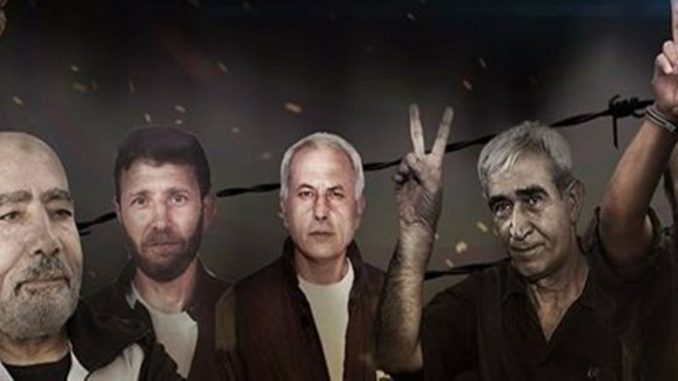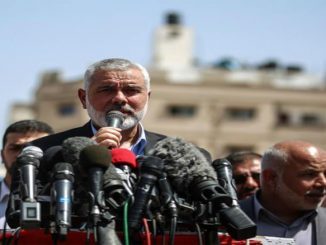
Palestinian leaders have warned the media to “remain cautious” regarding reports of alleged negotiations between Israeli officials and Palestinians towards reaching an agreement to end a mass prison strike that entered its 35th day on Sunday, as hundreds more joined the some 1,300 Palestinians currently forgoing food in protest of their conditions in Israeli prisons.
Hunger-striking prisoners are calling for an end to the denial of family visits, the right to pursue higher education, appropriate medical care and treatment, and an end to solitary confinement and administrative detention — imprisonment without charge or trial — among other demands for basic rights.
Alleged Israeli-Palestinian negotiations to end hunger strike
The media committee formed to support the hunger strikers released a statement on Sunday, stressing that the press be careful and “remain cautious” when publishing information on negotiations between prisoners and Israeli authorities, especially when the reports are sourced from Israeli media.
Reports emerged last week in Israeli media that Palestinian security officials and officials of Israel’s internal security agency, the Shin Bet, were attempting to reach an agreement that would end the hunger strike.
The Hebrew version of the Israeli daily Haaretz reported on Sunday that Israel Prison Service (IPS) officials have been speaking with Palestinian hunger strikers in order to reach an agreement to end the strike. The report cited an IPS official as saying that an “understanding with the hunger-striking prisoners could be reached in coming days,” though refused to label the talks as negotiations.
According to the official, a central issue of the alleged talks regarded the prisoners’ demand for increased family visits, with the official reportedly noting that IPS was willing to slightly increase the number of family visits to Palestinian prisoners in order to finalize an agreement.
A spokesperson for IPS told Ma’an that they had no information on such an agreement being made between IPS officials and prisoners.
However, according to the committee, Palestinian hunger strikers have consistently refused to accept negotiations without the presence of the strike’s leadership, most notably imprisoned Fatah leader Marwan Barghouthi who has remained in solitary confinement since the start of the strike in April.
Hunger-striking prisoners have previously stated that attempts by Israeli officials to enter negotiations without the strike’s leadership represented “false and futile negotiations aimed at breaking the hunger strike in exchange for empty promises.”
DFLP-affiliated hunger strikers continue forgoing food, as more join the strike
The committee also reported that Fadwa Barghouthi, wife of Marwan Barghouthi, said that 220 more Palestinian prisoners from various political factions joined the strike on Sunday.
Spokesperson for prisoners aligned with the Democratic Front for the Liberation of Palestine (DFLP) Jifara Jawda confirmed to Muhammad Dwikat, a member of the DFLP central committee, that the majority of DFLP-affiliated Palestinians in Israeli prisons continued their strike since joining on its first day on April 17.
Dwikat highlighted in a statement that after visiting DFLP-affiliated hunger striker Wajdi Jawda, the prisoner reported that at the beginning of the strike he was immediately transferred to solitary confinement — as numerous hunger strikers have been — in Israel’s Jalama prison. He was then transferred to solitary confinement in Ayalon prison in central Israel, and transferred once again to Eshel prison in Beersheba in southern Israel, where he has remained in solitary confinement.
Dwikat also noted that the health of hunger striker Samer Issawi, who is well-known among Palestinians for previously carrying out one of the longest hunger strikes in history, has been deteriorating since the start of May, as IPS has since transferred him to Israel’s Ramla prison clinic.
An International Committee of the Red Cross (ICRC) crew was also able to visit the youngest hunger-striking prisoner, 19-year-old Saed Yihya Dwikat from Beita village in Nablus, Jawda conveyed to Dwikat during the visit. Saed has been held in Israeli prisons for three years for his affiliation with the DFLP. The ICRC informed his family that their son’s health has continued to deteriorate, according to the statement.
Meanwhile, head of the Palestinian Committee of Prisoners’ Affairs Issa Qaraqe said in a statement that the ICRC must “take a comprehensive stance” regarding the health of the hunger strikers, and should “conduct efforts to protect the prisoners and monitor Israeli treatment of the prisoners.”
Qaraqe demanded that the ICRC “work fast” to exert pressure on IPS to force officials to “treat the hunger strikers according to humanitarian standards.”
Solidarity events continue in support of hunger strikers
The committee noted that it had declared a commercial strike on Sunday throughout the occupied Palestinian territory and Israel from 11 a.m. until 2 p.m. in solidarity with the hunger strikers, adding that all sectors would be participating, except the education and health sectors.
Meanwhile, a general strike is set to take place on Monday to coincide with US President Donald Trump’s arrival to Israel, with Palestinian leadership also calling for a “Day of Rage” on Tuesday during his planned visit with Abbas in Bethlehem.
Additionally, Palestine Liberation Organization (PLO) Executive Committee member Asad Abd al-Rahman declared that he launched a three-day solidarity hunger strike Saturday afternoon in support of the hunger strikers.
He said he would continue the hunger strike for three consecutive days in accordance with his health condition, but noted that “I know that my humble participation cannot match the level of the prisoners’ continued sacrifices.”



